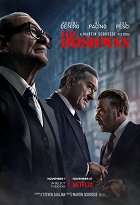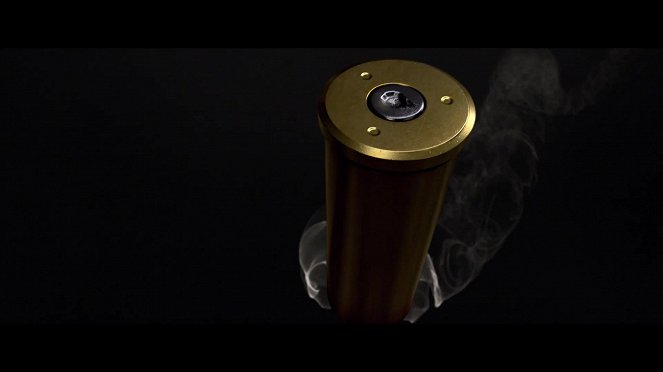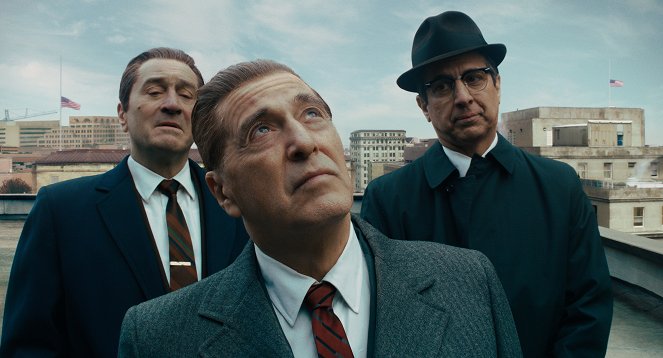Réalisation:
Martin ScorseseScénario:
Steven ZaillianPhotographie:
Rodrigo PrietoMusique:
Robbie RobertsonActeurs·trices:
Robert De Niro, Al Pacino, Joe Pesci, Bobby Cannavale, Harvey Keitel, Ray Romano, Stephen Graham, Anna Paquin, Stephanie Kurtzuba, Jack Huston (plus)VOD (1)
Résumés(1)
Cette saga sur le crime organisé dans l'Amérique de l'après-guerre est racontée du point de vue de Frank Sheeran, un ancien soldat de la Seconde Guerre mondiale devenu escroc et tueur à gages ayant travaillé aux côtés de quelques-unes des plus grandes figures du 20e siècle. Couvrant plusieurs décennies, le film relate l'un des mystères insondables de l'histoire des États-Unis : la disparition du légendaire dirigeant syndicaliste Jimmy Hoffa. Il offre également une plongée monumentale dans les arcanes de la mafia en révélant ses rouages, ses luttes internes et ses liens avec le monde politique. (Netflix)
(plus)Vidéo (7)
Critiques (16)
Syndicats vs. gouvernement américain des années 70, ça ne me concerne pas tellement. Mais grâce à la vivacité de la narration et à la représentation captivante du monde de la mafia, c'est presque aussi génial que Les Affranchis. De plus, nous évoluons ici beaucoup plus haut, parmi les plus hauts gradés de la mafia américaine de l'époque. De Niro a le plus de difficultés avec son visage artificiellement jeune et ses vieux yeux, au début il faut s'habituer à la digitalisation. Il joue son rôle de tueur de manière traditionnelle, comme nous avons l'habitude de le voir dans ce type de rôle. Pacino est plus original, incarnant Hoffa de manière excentrique, avec un enthousiasme politique, une fierté énorme et les intentions les plus pures moralement de tout le groupe. La performance d'acteur la plus notable du film. Pour moi, cependant, le plus grand plaisir a été Pesci, l'eau tranquille qui décide des vies. Du fou apathique avec un couteau à la main (Les Affranchis) à un joueur très influent avec un sens du jeu dans le monde de la mafia, sur lequel toutes les parties peuvent compter. Brillant dans chaque scène. Keitel a un minimum d'espace, mais dans le rôle de l'un des chefs les plus respectés de l'époque. Les marques de réalisation se font encore plus visibles lors d'une relecture. La scène phare, qui glace le sang, n'est pas accompagnée d'une musique tendue, mais d'un dialogue absurde sur les poissons. La durée n'est pas du tout un problème, ce « road-movie » est un plaisir nostalgique composé du style unique de Marty et de l'interaction d'acteurs légendaires, une expérience que nous ne retrouverons plus dans un autre film.
()
Par le biais de cette œuvre monumentale à l’ampleur démesurée, Martin Scorsese transmet aux spectateurs de Netflix un message les priant de mettre leur téléphone de côté quelques heures et de dévouer toute leur attention à son effort de longue haleine, le but étant de bien pouvoir assimiler la psychologie des personnages – l'élément pilier du film. De la trilogie imaginaire Les Affranchis, Casino, The Irishman, ce troisième numéro est le plus politique des trois et aussi le moins violent, sans pour autant être moins marquant ni déterminant. C’est aussi un film qu’il faut absolument revoir dans le temps. Quoi qu’il en soit, je croise les doigts pour que Pesci, autant que Pacino, reçoivent un Oscar.
()
There isn’t a more suitable and meaningful ending to one era of directors like Martin Scorsese and actors like Robert De Niro, Al Pacino, Joe Pesci or Harvey Keitel. It was really nice that all of the above mentioned had a chance to say farewell to the gangster-movie genre with a movie like The Irishman. Nowadays, gangster movies are rare. But as one of the few directors, Martin Scorsese has a patent to such movies, and therefore he precisely knew what he was doing. And of course he pulls you in and doesn’t let go. Still, 209 minutes is 209 minutes. Moreover, same parts are very nostalgic and melancholic, which had to be taken into consideration. The theme is good, but not good enough for me to rate it with 5 stars, as there had been more essential pieces of this genre in the past. Moreover, this movie brought a novelty – digital alteration and rejuvenation of some actors – which takes some getting used to and always makes me lament that it is not possible to stop the flow of time. I really like those actors so for me to see the differences in their appearance wasn’t something I wanted to see. According to my expectations, The Irishman is a good movie. Maybe a bit too classical for a gangster-movie genre with little action and way too long, but it brings you back to the era that all of those who watched The Irishman partly out of nostalgia simply liked.
()
When, after roughly two hours, The Irishman stops switching between the two narrative lines and three different time planes that together set the film’s rhythm, it becomes clear that the wedding was not actually the primary destination of Frank’s journey. At the same time, one important character from Frank’s past comes into the road-movie framework. Contrary to the custom of accelerating the pace as the end approaches, the film slows down and becomes more focused, no longer engaging in a series of diversions and jumping between numerous people and events. We realise that the memory of a given event is of fundamental importance for Frank and he wants to recount it in as much detail as possible, step by step, minute by minute. Thanks to the context provided by the previous two hours, we concurrently comprehend what this is leading to and what the individual characters are experiencing. We start to understand that Frank had merely been carrying out another one of his missions, which usually ends with a house getting painted. ___ In the first narrative line, Frank is in the final phase of his life, just before his death. In the other, he is heading toward death. It seems that all of the events in his life involve death and dying in some way. The detached approach to killing well demonstrates Scorsese’s departure from the more dynamic style of his earlier mafia films. In The Irishman, violence is not “cool”; sometimes we don’t even see it, we only hear it from a distance. If an upbeat song is playing in the car during one of the murders, that is only because the driver turned on the radio to drown out the death rattle of the strangled victim. ___ Frank's blackened conscience, a reminder of his sins and the incompatibility of violent behaviour with the feeling of having a safe home, is represented by his daughter Peggy, thanks to whom we realise that Frank fills his emotional emptiness with words and diverts attention from his inner self to the outside. Though Frank’s relationship with his daughter may seem to be of secondary importance in the context of a story in which people die, cars explode and mobsters bribe top politicians, it is that relationship which best describes how Frank feels and what he longs for above all else: to go out into the world reconciled with himself and with his loved ones. Despite first appearances, the core of the film thus does not represent Frank’s involvement in the structures of the Italian-American mafia and trade unions, but what he lost due to his career advancement. Civil dialogue and time spent in the family circle appear to be more important than a detailed description of the underworld and a factual depiction of Frank’s work processes. Rather than an epic mafia saga, The Irishman is primarily an intimate drama about dysfunctional relationships and the constant presence of death, the basis of which we always carry within ourselves (as we realise thanks also to digitally rejuvenated acting veterans). 95%
()
I’m sorry, but with this film I have the same problem as with almost every gangster movie focused exclusively on the mobsters. When the efforts of detectives or courts to break the gang get some space (like in this year’s The Traitor or in Scorsese’s The Departed), I’m fine with it, but I hate to watch the fates of characterless, arrogant assholes whose actions, though not directly glorified by the film language, are presented as something cool that should “entertain” the viewers. More so when the main character, besides not having any character, also lacks any interesting qualities; and more so when it has an unreasonable four-hour long run. The Irishman is well made, I guess, and it will satisfy the fans of mafia opuses, but I couldn’t get anything out of it. The plot wasn’t interesting (moreover, despite a number of flashbacks, the conclusion is very predictable), I couldn’t even find any formal pearls, because, other than the digital deageing (that works so-so), there aren’t any. I didn’t find a single interesting scene that could be somehow formally attractive. In short, I only watched it out of respect for the gentlemen behind it, thanks to which, the last hour and a half or so is a little more interesting than the rest. But, even though I subscribe to the words that Scorsese addressed at Marvel, the sad truth is that I would rather watch again the last Avengers than The Irishman.
()



Annonces